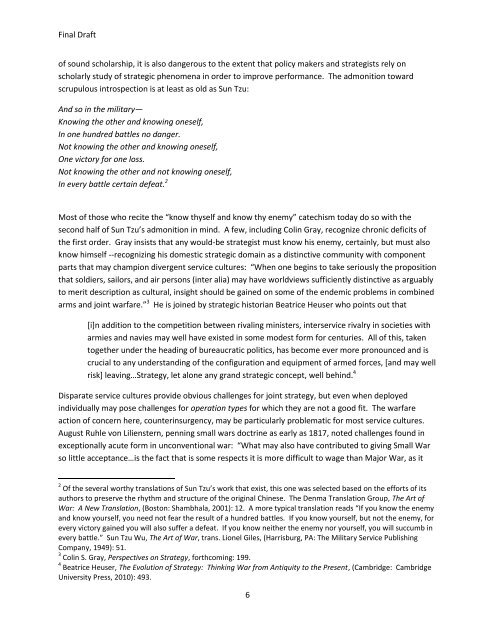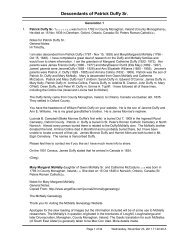Assessing the Strategic Impact of Service Culture on ...
Assessing the Strategic Impact of Service Culture on ...
Assessing the Strategic Impact of Service Culture on ...
You also want an ePaper? Increase the reach of your titles
YUMPU automatically turns print PDFs into web optimized ePapers that Google loves.
Final Draft<br />
<str<strong>on</strong>g>of</str<strong>on</strong>g> sound scholarship, it is also dangerous to <str<strong>on</strong>g>the</str<strong>on</strong>g> extent that policy makers and strategists rely <strong>on</strong><br />
scholarly study <str<strong>on</strong>g>of</str<strong>on</strong>g> strategic phenomena in order to improve performance. The adm<strong>on</strong>iti<strong>on</strong> toward<br />
scrupulous introspecti<strong>on</strong> is at least as old as Sun Tzu:<br />
And so in <str<strong>on</strong>g>the</str<strong>on</strong>g> military—<br />
Knowing <str<strong>on</strong>g>the</str<strong>on</strong>g> o<str<strong>on</strong>g>the</str<strong>on</strong>g>r and knowing <strong>on</strong>eself,<br />
In <strong>on</strong>e hundred battles no danger.<br />
Not knowing <str<strong>on</strong>g>the</str<strong>on</strong>g> o<str<strong>on</strong>g>the</str<strong>on</strong>g>r and knowing <strong>on</strong>eself,<br />
One victory for <strong>on</strong>e loss.<br />
Not knowing <str<strong>on</strong>g>the</str<strong>on</strong>g> o<str<strong>on</strong>g>the</str<strong>on</strong>g>r and not knowing <strong>on</strong>eself,<br />
In every battle certain defeat. 2<br />
Most <str<strong>on</strong>g>of</str<strong>on</strong>g> those who recite <str<strong>on</strong>g>the</str<strong>on</strong>g> “know thyself and know thy enemy” catechism today do so with <str<strong>on</strong>g>the</str<strong>on</strong>g><br />
sec<strong>on</strong>d half <str<strong>on</strong>g>of</str<strong>on</strong>g> Sun Tzu’s adm<strong>on</strong>iti<strong>on</strong> in mind. A few, including Colin Gray, recognize chr<strong>on</strong>ic deficits <str<strong>on</strong>g>of</str<strong>on</strong>g><br />
<str<strong>on</strong>g>the</str<strong>on</strong>g> first order. Gray insists that any would-be strategist must know his enemy, certainly, but must also<br />
know himself --recognizing his domestic strategic domain as a distinctive community with comp<strong>on</strong>ent<br />
parts that may champi<strong>on</strong> divergent service cultures: “When <strong>on</strong>e begins to take seriously <str<strong>on</strong>g>the</str<strong>on</strong>g> propositi<strong>on</strong><br />
that soldiers, sailors, and air pers<strong>on</strong>s (inter alia) may have worldviews sufficiently distinctive as arguably<br />
to merit descripti<strong>on</strong> as cultural, insight should be gained <strong>on</strong> some <str<strong>on</strong>g>of</str<strong>on</strong>g> <str<strong>on</strong>g>the</str<strong>on</strong>g> endemic problems in combined<br />
arms and joint warfare.” 3 He is joined by strategic historian Beatrice Heuser who points out that<br />
[i]n additi<strong>on</strong> to <str<strong>on</strong>g>the</str<strong>on</strong>g> competiti<strong>on</strong> between rivaling ministers, interservice rivalry in societies with<br />
armies and navies may well have existed in some modest form for centuries. All <str<strong>on</strong>g>of</str<strong>on</strong>g> this, taken<br />
toge<str<strong>on</strong>g>the</str<strong>on</strong>g>r under <str<strong>on</strong>g>the</str<strong>on</strong>g> heading <str<strong>on</strong>g>of</str<strong>on</strong>g> bureaucratic politics, has become ever more pr<strong>on</strong>ounced and is<br />
crucial to any understanding <str<strong>on</strong>g>of</str<strong>on</strong>g> <str<strong>on</strong>g>the</str<strong>on</strong>g> c<strong>on</strong>figurati<strong>on</strong> and equipment <str<strong>on</strong>g>of</str<strong>on</strong>g> armed forces, [and may well<br />
risk] leaving…Strategy, let al<strong>on</strong>e any grand strategic c<strong>on</strong>cept, well behind. 4<br />
Disparate service cultures provide obvious challenges for joint strategy, but even when deployed<br />
individually may pose challenges for operati<strong>on</strong> types for which <str<strong>on</strong>g>the</str<strong>on</strong>g>y are not a good fit. The warfare<br />
acti<strong>on</strong> <str<strong>on</strong>g>of</str<strong>on</strong>g> c<strong>on</strong>cern here, counterinsurgency, may be particularly problematic for most service cultures.<br />
August Ruhle v<strong>on</strong> Lilienstern, penning small wars doctrine as early as 1817, noted challenges found in<br />
excepti<strong>on</strong>ally acute form in unc<strong>on</strong>venti<strong>on</strong>al war: “What may also have c<strong>on</strong>tributed to giving Small War<br />
so little acceptance…is <str<strong>on</strong>g>the</str<strong>on</strong>g> fact that is some respects it is more difficult to wage than Major War, as it<br />
2 Of <str<strong>on</strong>g>the</str<strong>on</strong>g> several worthy translati<strong>on</strong>s <str<strong>on</strong>g>of</str<strong>on</strong>g> Sun Tzu’s work that exist, this <strong>on</strong>e was selected based <strong>on</strong> <str<strong>on</strong>g>the</str<strong>on</strong>g> efforts <str<strong>on</strong>g>of</str<strong>on</strong>g> its<br />
authors to preserve <str<strong>on</strong>g>the</str<strong>on</strong>g> rhythm and structure <str<strong>on</strong>g>of</str<strong>on</strong>g> <str<strong>on</strong>g>the</str<strong>on</strong>g> original Chinese. The Denma Translati<strong>on</strong> Group, The Art <str<strong>on</strong>g>of</str<strong>on</strong>g><br />
War: A New Translati<strong>on</strong>, (Bost<strong>on</strong>: Shambhala, 2001): 12. A more typical translati<strong>on</strong> reads “If you know <str<strong>on</strong>g>the</str<strong>on</strong>g> enemy<br />
and know yourself, you need not fear <str<strong>on</strong>g>the</str<strong>on</strong>g> result <str<strong>on</strong>g>of</str<strong>on</strong>g> a hundred battles. If you know yourself, but not <str<strong>on</strong>g>the</str<strong>on</strong>g> enemy, for<br />
every victory gained you will also suffer a defeat. If you know nei<str<strong>on</strong>g>the</str<strong>on</strong>g>r <str<strong>on</strong>g>the</str<strong>on</strong>g> enemy nor yourself, you will succumb in<br />
every battle.” Sun Tzu Wu, The Art <str<strong>on</strong>g>of</str<strong>on</strong>g> War, trans. Li<strong>on</strong>el Giles, (Harrisburg, PA: The Military <str<strong>on</strong>g>Service</str<strong>on</strong>g> Publishing<br />
Company, 1949): 51.<br />
3 Colin S. Gray, Perspectives <strong>on</strong> Strategy, forthcoming: 199.<br />
4 Beatrice Heuser, The Evoluti<strong>on</strong> <str<strong>on</strong>g>of</str<strong>on</strong>g> Strategy: Thinking War from Antiquity to <str<strong>on</strong>g>the</str<strong>on</strong>g> Present, (Cambridge: Cambridge<br />
University Press, 2010): 493.<br />
6

















